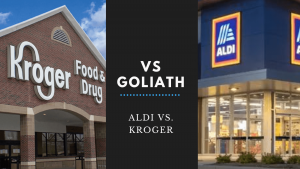
The grocery wars are absolutely exploding right now, and it’s not just about the big players anymore! While chains like Walmart and Amazon duke it out for supremacy, there’s a quieter revolution happening in the aisles that’s about to shake everything up. Aldi, the scrappy German discount chain, is taking on Kroger – one of America’s most established grocery titans, and actually winning customers with a radically different approach that’s turning heads everywhere. One company has been perfecting the American grocery experience for over 140 years, while the other is completely rewriting the playbook. The question isn’t whether Aldi can compete with Kroger anymore; it’s whether Kroger can adapt fast enough to survive.
Kroger’s story is pure American grocery royalty. Bernard Kroger opened his first store in Cincinnati in 1883 with just $372 and a simple but powerful promise: “Be particular. Never sell anything you would not want yourself.” That commitment to quality helped build what would become America’s largest traditional supermarket empire. Kroger was innovative from day one. They were among the first grocers to bake bread in-store, cut meat to order, and stay open past 6 PM. Today, Kroger is an absolute powerhouse, generating around $150 billion in annual revenue and operating nearly 2,800 stores across 35 states under banners like Kroger, Ralphs, and King Soopers. The company has mastered the art of the American supermarket: massive stores packed with 50,000+ products, full-service departments, and everything from pharmacies to gas stations. Kroger’s approach is built on choice and convenience. If you want it, they probably have it, and they’ll make shopping for it as easy as possible.
But here comes Aldi with a completely different playbook that’s blowing minds across America! The German brothers Karl and Theo Albrecht built their discount empire on ruthless efficiency, and when Aldi opened its first U.S. store in Iowa in 1976, American shoppers had never experienced anything quite like it. Fast forward to today and hold onto your shopping carts. By February 2024, Aldi had exploded to 2,356 stores across the U.S., with plans to add a staggering 800 more by 2028. The Aldi model strips grocery shopping to its bare essentials: small stores, limited selection, quarter-deposit shopping carts, and customers bagging their own groceries. You literally need a quarter to get a cart, and if you forget to bring your own bags, you’re buying them at checkout. What sounds like inconvenience is actually pure genius. Every cost-saving measure translates to lower prices that’ll make your wallet sing. Aldi’s U.S. retail sales hit approximately $40.2 billion in 2022 and are estimated to have reached $44–$45 billion in 2024, a clear sign that Americans are embracing the brand’s stripped-down, efficiency-first model
The contrast between these two approaches is mind-blowing. Shopping at Kroger feels familiar and luxurious with wide aisles, endless options, and helpful staff ready to assist. You can grab a coffee at the Starbucks, pick up prescriptions at the pharmacy, and earn fuel points while you shop. It’s the premium grocery experience most Americans grew up with and love. Aldi, on the other hand, feels like a totally different experience: streamlined, no-nonsense, and laser-focused on getting quality food at lower prices. While Kroger stocks dozens of cereal brands, Aldi might carry four, but theirs will cost 40% less, and you better believe their Simply Nature organic line rivals anything on Kroger’s shelves. Get this: Aldi opened more U.S. stores in 2022 and 2023 than any other grocery chain – 87 openings in 2022 and 109 in 2023, more than doubling second-place Publix!
What makes this competition fascinating is that both companies are succeeding, but for different reasons. Kroger has built deep community roots and customer loyalty over more than a century. Walk into any Kroger and you’ll find their signature fuel rewards program, massive floral departments, and those distinctive red shopping carts that have become as American as apple pie. But Kroger’s real innovation is how they’ve extended their reach – their delivery trucks now serve customers in states where they don’t even have physical stores, bringing groceries from automated fulfillment centers directly to doorsteps across the country. Their digital investments, pickup services, and loyalty programs show they’re not stuck in the past. But Aldi’s aggressive expansion proves there’s huge demand for their stripped-down approach. At Aldi, cashiers sit while they scan (another European touch), products stay in their shipping boxes on the shelves, and you’ll race other shoppers to snag the weekly Special Buys – everything from snow boots to kayaks that appear and disappear like grocery store unicorns. During inflationary periods, when every dollar counts, Aldi’s value proposition becomes irresistible. The company’s private-label strategy – roughly 90% of their products are store brands – allows them to control quality while keeping prices low.
The beautiful thing about this rivalry is that it’s pushing both companies to be better. Kroger has responded to Aldi’s challenge by expanding their private-label offerings and introducing smaller-format stores. Meanwhile, Aldi is slowly adding conveniences like credit card acceptance and expanded fresh produce sections. Both started with clear visions – Kroger’s focus on selection and service, Aldi’s obsession with efficiency and value – and both have stuck to their core principles while adapting to changing markets. In the end, this competition isn’t just about two grocery chains – it’s about two different philosophies of retail, and American consumers are the real winners.

September 18, 2025
There’s a coffee revolution happening, and most people don’t even realize it yet. While you’ve been standing in line athttps://www.chainstoreguide.com.
April 17, 2025
In the evolving world of athleisure, Lululemon has long worn the crown; the undisputed Goliath of premium activewear. However, ashttps://www.chainstoreguide.com.
March 13, 2025
Grocery stores always have stiff competition, with the largest chains holding firmly at the top. Despite this, there is stillhttps://www.chainstoreguide.com.